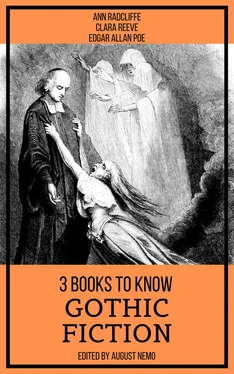‘Please you, my lord,’ replied Anthony, ‘I never was a good one at unlocking a door in my life, but here is Gregory will do it.’—‘No, my lord, an’ please you,’ said Gregory, ‘here is Richard.’—‘Stand off,’ said the marquis, ‘I will shame your cowardice, and do it myself.’
Saying this he turned the key, and was rushing on, but the door refused to yield; it shook under his hands, and seemed as if partially held by some person on the other side. The marquis was surprized, and made several efforts to move it, without effect. He then ordered his servants to burst it open, but, shrinking back with one accord, they cried, ‘For God’s sake, my lord, go no farther; we are satisfied here are no ghosts, only let us get back.’
‘It is now then my turn to be satisfied,’ replied the marquis, ‘and till I am, not one of you shall stir. Open me that door.’—‘My lord!’—‘Nay,’ said the marquis, assuming a look of stern authority —‘dispute not my commands. I am not to be trifled with.’
They now stepped forward, and applied their strength to the door, when a loud and sudden noise burst from within, and resounded through the hollow chambers! The men started back in affright, and were rushing headlong down the stair-case, when the voice of the marquis arrested their flight. They returned, with hearts palpitating with terror. ‘Observe what I say,’ said the marquis, ‘and behave like men. Yonder door,’ pointing to one at some distance, ‘will lead us through other rooms to this chamber — unlock it therefore, for I will know the cause of these sounds.’ Shocked at this determination, the servants again supplicated the marquis to go no farther; and to be obeyed, he was obliged to exert all his authority. The door was opened, and discovered a long narrow passage, into which they descended by a few steps. It led to a gallery that terminated in a back stair-case, where several doors appeared, one of which the marquis unclosed. A spacious chamber appeared beyond, whose walls, decayed and discoloured by the damps, exhibited a melancholy proof of desertion.
They passed on through a long suite of lofty and noble apartments, which were in the same ruinous condition. At length they came to the chamber whence the noise had issued. ‘Go first, Robert, with the light,’ said the marquis, as they approached the door; ‘this is the key.’ Robert trembled — but obeyed, and the other servants followed in silence. They stopped a moment at the door to listen, but all was still within. The door was opened, and disclosed a large vaulted chamber, nearly resembling those they had passed, and on looking round, they discovered at once the cause of the alarm. — A part of the decayed roof was fallen in, and the stones and rubbish of the ruin falling against the gallery door, obstructed the passage. It was evident, too, whence the noise which occasioned their terror had arisen; the loose stones which were piled against the door being shook by the effort made to open it, had given way, and rolled to the floor.
After surveying the place, they returned to the back stairs, which they descended, and having pursued the several windings of a long passage, found themselves again in the marble hall. ‘Now,’ said the marquis, ‘what think ye? What evil spirits infest these walls? Henceforth be cautious how ye credit the phantasms of idleness, for ye may not always meet with a master who will condescend to undeceive ye.’— They acknowledged the goodness of the marquis, and professing themselves perfectly conscious of the error of their former suspicions, desired they might search no farther. ‘I chuse to leave nothing to your imagination,’ replied the marquis, ‘lest hereafter it should betray you into a similar error. Follow me, therefore; you shall see the whole of these buildings.’ Saying this, he led them to the south tower. They remembered, that from a door of this tower the figure which caused their alarm had issued; and notwithstanding the late assertion of their suspicions being removed, fear still operated powerfully upon their minds, and they would willingly have been excused from farther research. ‘Would any of you chuse to explore this tower?’ said the marquis, pointing to the broken stair-case; ‘for myself, I am mortal, and therefore fear to venture; but you, who hold communion with disembodied spirits, may partake something of their nature; if so, you may pass without apprehension where the ghost has probably passed before.’ They shrunk at this reproof, and were silent.
The marquis turning to a door on his right hand, ordered it to be unlocked. It opened upon the country, and the servants knew it to be the same whence the figure had appeared. Having relocked it, ‘Lift that trapdoor; we will desend into the vaults,’ said the marquis. ‘What trapdoor, my Lord?’ said Robert, with encreased agitation; ‘I see none.’ The marquis pointed, and Robert, perceived a door, which lay almost concealed beneath the stones that had fallen from the stair-case above. He began to remove them, when the marquis suddenly turning —‘I have already sufficiently indulged your folly,’ said he, ‘and am weary of this business. If you are capable of receiving conviction from truth, you must now be convinced that these buildings are not the haunt of a supernatural being; and if you are incapable, it would be entirely useless to proceed. You, Robert, may therefore spare yourself the trouble of removing the rubbish; we will quit this part of the fabric.’
The servants joyfully obeyed, and the marquis locking the several doors, returned with the keys to the habitable part of the castle.
Every enquiry after Julia had hitherto proved fruitless; and the imperious nature of the marquis, heightened by the present vexation, became intolerably oppressive to all around him. As the hope of recovering Julia declined, his opinion that Emilia had assisted her to escape strengthened, and he inflicted upon her the severity of his unjust suspicions. She was ordered to confine herself to her apartment till her innocence should be cleared, or her sister discovered. From Madame de Menon she received a faithful sympathy, which was the sole relief of her oppressed heart. Her anxiety concerning Julia daily encreased, and was heightened into the most terrifying apprehensions for her safety. She knew of no person in whom her sister could confide, or of any place where she could find protection; the most deplorable evils were therefore to be expected.
One day, as she was sitting at the window of her apartment, engaged in melancholy reflection, she saw a man riding towards the castle on full speed. Her heart beat with fear and expectation; for his haste made her suspect he brought intelligence of Julia; and she could scarcely refrain from breaking through the command of the marquis, and rushing into the hall to learn something of his errand. She was right in her conjecture; the person she had seen was a spy of the marquis’s, and came to inform him that the lady Julia was at that time concealed in a cottage of the forest of Marentino. The marquis, rejoiced at this intelligence, gave the man a liberal reward. He learned also, that she was accompanied by a young cavalier; which circumstance surprized him exceedingly; for he knew of no person except the Count de Vereza with whom she could have entrusted herself, and the count had fallen by his sword! He immediately ordered a party of his people to accompany the messenger to the forest of Marentino, and to suffer neither Julia nor the cavalier to escape them, on pain of death.
When the Duke de Luovo was informed of this discovery, he entreated and obtained permission of the marquis to join in the pursuit. He immediately set out on the expedition, armed, and followed by a number of his servants. He resolved to encounter all hazards, and to practice the most desperate extremes, rather than fail in the object of his enterprize. In a short time he overtook the marquis’s people, and they proceeded together with all possible speed. The forest lay several leagues distant from the castle of Mazzini, and the day was closing when they entered upon the borders. The thick foliage of the trees spread a deeper shade around; and they were obliged to proceed with caution. Darkness had long fallen upon the earth when they reached the cottage, to which they were directed by a light that glimmered from afar among the trees. The duke left his people at some distance; and dismounted, and accompanied only by one servant, approached the cottage. When he reached it he stopped, and looking through the window, observed a man and woman in the habit of peasants seated at their supper. They were conversing with earnestness, and the duke, hoping to obtain farther intelligence of Julia, endeavoured to listen to their discourse. They were praising the beauty of a lady, whom the duke did not doubt to be Julia, and the woman spoke much in praise of the cavalier. ‘He has a noble heart,’ said she; ‘and I am sure, by his look, belongs to some great family.’—‘Nay,’ replied her companion, ‘the lady is as good as he. I have been at Palermo, and ought to know what great folks are, and if she is not one of them, never take my word again. Poor thing, how she does take on! It made my heart ache to see her.’
Читать дальше












